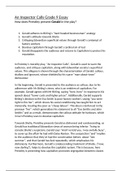An Inspector Calls Grade 9 Essay
How does Preistley present Gerald in the play?
1. Gerald adheres to Birling’s “hard headed businessman” analogy
2. Gerald’s attitude towards Shelia
3. Critiquing Edwardian superficial values through Gerald’s contempt of
factory workers
4. Devalue capitalism through Gerald’s cardinal sin of lust
5. Gerald disappoints the audience and returns to Capitalism to protect his
reputation.
In Preistley’s morality play, “An Inspector Calls”, Gerald is used to warn the
audience, and critique capitalism, along with Edwardian society’s superficial
values. This allegory is shown through the characterisation of Gerald: callous,
shallow and ignorant, whose shielded by his suave “man-about-town”
demeanour.
In the beginning, Gerald is presented to the audience as callous, due to his
adherence with Mr Birling’s views, who is an emblem of capitalism. For
example, Gerald agrees with Mr Birling, saying “here, here” in response to his
speech about “lower costs and higher prices”. Additionally, Gerald supports
Birling’s decision to fire Eva Smith (a poor factory worker), saying “you were
right to fire her”, which shows his social conditioning has taught him to act
immorally, treating the poor as “cheap labour”. This idea is reinforced in the
pronoun “her”: which generalizes his statement to all “Eva Smiths and John
Smiths” and as a result, demonstrates the callous attitude he harbours, which
in turn Preistley uses to devalue capitalism
Towards Shelia, Preistley presents Gerald as dishonest and condescending, as
Gerald has traditional Edwardian views of woman being inferior. Trying to
console Shelia’s suspicions, Gerald says “And I’ve told you, I was awfully busy”,
to cover up the affair he had with Daisy Renton. The conjunction “and” implies
to the audience that they’ve had the conversation before, about “last
summer”, and that Gerald has lied repeatedly, which emphasises his
dishonesty. Furthermore, Gerald’s condescending treatment of Shelia, (“now,
now darling”), helps to devalue the capitalist system. This is because, here
Preistley is presenting how capitalism promotes segregation between classes





